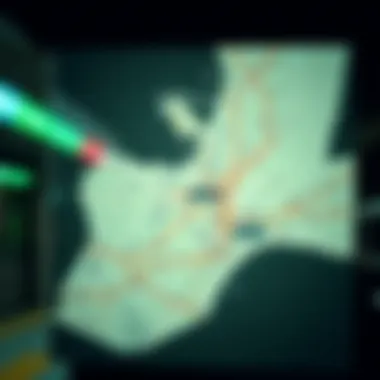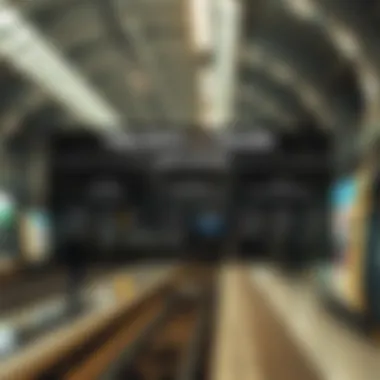Navigating Expo Metro Timings in Dubai


Intro
Navigating through the vibrant expanse of Dubai demands not just your physical presence but also an understanding of its transport system, particularly the Expo Metro. There’s a unique rhythm to how the Metro runs, especially catering to an influx of visitors and residents alike, primarily drawn by major events like the Expo. Grasping the timings and operational nuances of this transit can truly enhance your journey, allowing for a seamless experience, whether you are travelling for work or pleasure.
With the bustling nature of Dubai's transport, it’s vital to stay informed about the timings and peak hours that dictate how crowds move. This guide aims to peel back the layers, offering insights rooted in genuine experience and data. It will not just provide a clock to follow but also a map to understand the ebb and flow of commuters, ensuring you’re not just along for the ride, but rather a well-prepared traveler.
The Metro is more than a means of transport; it is part of the fabric of Dubai's innovation and connectivity. If you ever found yourself stuck in a long line or confused about the next stop, this comprehensive guide is for you. Plus, understanding these logistical details will enable you to engage with Dubai's rich culture without the stress of unpredicted transit delays.
Now, let’s dive into the timings you need to know!
Overview of Expo Metro
The Expo Metro is more than just a transit system; it's a lifeline connecting individuals throughout the vibrant urban landscape of Dubai. This commentary on the Expo Metro's operational significance goes beyond conventional wisdom to emphasize its role in shaping the daily routines of countless residents and visitors alike. Understanding how this metro functions is crucial for making informed travel choices, as it can drastically affect time management and overall satisfaction during one’s journey.
Importance of Expo Metro
The Expo Metro underpins the day-to-day mobility of those traversing Dubai, playing a pivotal part in facilitating smooth transit to key destinations. With many individuals relying on this system, its importance centers on several critical elements:
- Efficiency: With trains running frequently, commuters can enjoy reduced waiting times, which is essential for those on tight schedules.
- Accessibility: The Expo Metro serves as a bridge for various communities to access entertainment, work hubs, and cultural experiences, promoting inclusivity and connectivity.
- Economic Boost: A well-functioning metro system can incentivize travel, thus contributing to overall economic growth by enhancing foot traffic in commercial areas.
- Environmental Benefits: By encouraging public transport usage over individual cars, the Expo Metro contributes to lowering carbon emissions—an essential factor in today’s climate-conscious society.
Connections to Major Locations
The Expo Metro doesn't just operate in isolation; rather, it is intricately linked to several major locales that enrich the travel experience for its users. These connections include:
- Expo 2020 Site: Naturally, the Metro connects directly to one of the most anticipated global events at the Expo 2020 site, attracting visitors from all corners of the globe.
- Dubai International Airport: Travelers can hop onto the metro, making airport access and travel seamlessly connected; this is crucial for ensuring a smooth transition for international arrivals and departures.
- Business Hubs: With connections to essential business centers, professionals can navigate their commutes safely and quickly, expediting their journeys to meetings and conferences.
- Leisure and Shopping Districts: From the dazzling malls to entertainment venues, the Expo Metro opens myriad pathways for leisure activities, ensuring that the vibrant culture of Dubai is always within reach.
The importance of the Expo Metro, thus, lies not just in its role as an efficient means of transport but also in its ability to weave together communities, support economic activity, and facilitate access to experiences. Understanding this is vital for anyone wanting to make the most out of their time in Dubai.
Metro Operational Hours
Understanding the operational hours of the Expo Metro is crucial for anyone navigating the dynamic transit landscape of Dubai. Not only do these hours dictate when individuals can access the metro system, but they also influence broader commuting patterns and travel planning. Grasping how Metro timings align with personal schedules is a game changer for travelers, ensuring that no one gets caught waiting when they could be on the move.
Weekday Timings


During the week, the Expo Metro operates with a structured schedule designed to accommodate the regular flow of commuters. Generally, Monday to Thursday, trains run from 5 AM to midnight, providing ample time for early birds and night owls alike. On Fridays, service begins slightly later, at 8 AM, continuing until 1 AM on Saturday. This variation reflects the local culture and encourages a more relaxed pace on weekends.
Weekdays often see peak hours from 7 AM to 9 AM and 5 PM to 7 PM. It is during these times that trains can become crowded, especially on routes connecting major business districts. Commuters are advised to plan accordingly, considering alternative routes or travel times that may offer a smoother journey. Here's a quick overview:
- Monday to Thursday: 5 AM - midnight
- Friday: 8 AM - 1 AM
- Saturday: 10 AM - 1 AM
- Sunday: 10 AM - midnight
Weekend and Holiday Timings
On weekends and public holidays, the Expo Metro adapts its schedule to reflect lower commuter demands. Despite the reduced frequency, service remains consistent, allowing both leisure travelers and residents to explore Dubai’s vibrant attractions. On Fridays and Saturdays, the operational hours extend into the late night, catering to the buzzing nightlife and events.
During notable holidays, such as UAE National Day or Eid celebrations, the Metro extends its service hours even further, with some days seeing operations from early morning until the early hours of the following day. This flexibility becomes vital during festive occasions when many individuals travel to shopping centers, parks, and other leisure venues. A clear understanding of these timings allows visitors and locals to better plan their outings.
Seasonal Variations
Metro operational hours can also shift in response to seasonal changes relevant to the region. For example, adjustments might occur during the summer months when the demand fluctuates, and many residents take vacations or change their routines. The Expo Metro typically maintains a similar schedule year-round but may introduce additional late-night trains or altered Sunday openings during peak tourist seasons.
In essence, it’s important for users to stay informed about these seasonal variations to avoid inconvenience. Being cognizant of when operational changes take place can save both time and unnecessary hassle during travel.
Key Takeaway: Having a firm grip on the Expo Metro's operational hours enhances the overall commuting experience, ensuring that you are always prepared to travel efficiently—no matter the day or season.
Factors Affecting Timings
Understanding the various elements that can influence the Expo Metro timings is crucial, especially for commuters who rely on it for daily travel. Timings may not always be consistent and can change due to several external factors. Awareness of these aspects can aid individuals in planning their journeys more effectively, ensuring they avoid any unexpected delays or inconveniences that might disrupt their schedules.
Public Holidays
Public holidays are a significant factor that can affect the schedules of the Expo Metro. During these times, the operational hours may be altered to accommodate the increase in passenger volume as well as provide ample service hours to those partaking in celebrations or events. For instance, during the Eid holidays, many families take advantage of the extended time off to travel, leading to changes in both frequency and timing of trains. It’s wise for commuters to check the transit authority's announcements regarding revised schedules during holiday periods to avoid missed connections.
Special Events
Special events, such as exhibitions, concerts, or sporting events at the Expo site and nearby venues, can also impact Metro timings. When large gatherings occur, the demand for transportation spikes. To manage this, the system may extend service hours or increase the number of cars on certain trains to minimize crowding. Attendees should remain vigilant and stay informed about event days as these peak times might require additional planning. Following relevant social media updates or official channels can be beneficial.
“Changes in Metro schedules during special events are often communicated via the Dubai Metro Twitter account. Planning ahead proves helpful.”


Routine Maintenance
Routine maintenance is another aspect that can influence metro operations. To ensure the safety and efficiency of the transit system, scheduled maintenance tasks are necessary. These typically occur during off-peak hours but can lead to altered schedules and sometimes, reduced service on specific lines. Passengers should keep a close eye on maintenance announcements as they can lead to significant delays or service interruptions. It's advisable to check the official website or apps for upcoming maintenance schedules to avoid inconvenience.
By keeping these factors in mind, commuters can navigate the Expo Metro system with greater ease, enhancing their overall travel experience in Dubai’s bustling transport network. Understanding how public holidays, special events, and routine maintenance impact metro timings empowers riders to plan accordingly.
Navigating the Expo Metro
Navigating the Expo Metro can be a rewarding experience, especially for those keen on discovering Dubai's extensive and efficient transport system. Understanding how to move through this network not only saves time but also enhances one’s overall travel experience. For residents and visitors alike, grasping the layout of the metro, including station features and transfer options, is key to smooth commuting.
Stations Overview
The Expo Metro line features several strategically located stations, each designed to cater to different attractions and neighborhoods in Dubai. The stations are equipped with modern amenities, ensuring a comfortable journey.
- Expo 2020 Station: As the crown jewel, this station welcomes travelers intending to experience the iconic Expo event. It boasts state-of-the-art facilities designed to handle a high volume of passengers.
- Al Furjan Station: Located near flourishing residential communities, this station offers easy access to family-friendly neighborhoods, making it a favorite among locals.
- Jebel Ali Station: This station connects passengers to major business hubs, industrial areas, and residential districts, offering seamless transitions for both workers and visitors.
The architecture of the stations often reflects elements of Dubai's rich culture and modernity. Moreover, clear signage, escalators in good condition, and information booths significantly ease the navigation process. Regular announcements inform commuters about train schedules and any potential service changes — essential for those on tight schedules.
Transfer Options
Efficient transfer options are one of the cornerstones of the Expo Metro's usability. The metro's design accommodates easy transitions between various lines, which is particularly beneficial during peak hours.
- At interchanges: Key stations like Union and Burjuman allow for simple transfers between the Red and Green Lines. Both stations are equipped with clear maps, making it simple to figure out which direction to take next.
- Buses and Trams: A well-connected bus and tram network complements the metro, providing additional transport options. Many metro stations have bus stops nearby, allowing passengers to hop on a bus to reach their final destination. Particularly, if you are headed to locations not directly served by the metro.
- Walkways: Some major stations, such as Dubai Mall and Burj Khalifa, have integrated walkways connecting them to key attractions. These pedestrian pathways are designed for ease and convenience, making it hassle-free to journey from a station to a nearby site.
Commuters are encouraged to be mindful of the timings and potential delays while navigating through transfers. Asides from regular operational hours, events and special holidays can influence the crowd and the overall pace of commuting. So keeping an eye on schedules and planning ahead can make a world of difference.
Future Developments
As cities evolve, so too must their transport infrastructures. The future developments of the Expo Metro are a topic of significant relevance, not just for the daily ridership but also for investors and residents keen on understanding the growth dynamics in Dubai. The ongoing enhancements and proposed changes aim to streamline operations, increase efficiency, and respond to the evolving needs of commuters.
Proposed Schedule Changes
The proposed schedule changes are geared towards optimizing peak travel times and increasing coverage in response to demand. For instance, during major events,*such as international expos or festivals, the metro may extend its operational hours to accommodate higher passenger volumes. This flexibility is crucial in a city like Dubai, known for its dynamic events calendar.


Additionally, advancements in technology and data analytics are likely to inform these schedule changes. With data-driven insights into travel patterns, the Expo Metro can adjust timings more efficiently, ensuring that service is accessible when and where it is needed most.
Some of these proposed changes include:
- Increased frequency during peak hours: More trains may run at shorter intervals, keeping the flow of passengers smooth.
- Direct routes to new developments: Proposed stops at newly developed areas can save time for travelers.
- Integration with other modes of transport: New schedules will aim to better align with bus and tram services, creating seamless transitions for travelers.
Impact on Commuters
The impact of these future developments on commuters is inherently profound. For regular users of the Expo Metro, the proposed changes promise a more tailored experience. Imagine hopping on a train that arrives when you need it most, or reducing your travel time significantly because of new routes.
Commuters will experience:
- Enhanced reliability: With more frequent trains, waiting times will likely diminish, making commuting less of a chore.
- Reduced congestion: Well-timed operational changes can alleviate rush-hour crowds, transforming the commuting journey into a less stressful experience.
- Access to new areas: New routes open up opportunities for leisure, business, and residential exploration.
Overall, these developments are about more than just moving people from point A to point B; they are about fostering community ties and improving the overall quality of life in Dubai. With thoughtfully proposed schedules and an eye towards future demands, the Expo Metro is well-poised to meet the needs of its users while enhancing the overall transportation landscape.
"A city’s transportation system is like the veins in a human body; efficient transport ensures the lifeblood of urban life flows smoothly."
In summary, as the Expo Metro anticipates its future developments, it stays in tune with the evolving demands of its riders. Staying informed about these changes is crucial for anyone investing, renting, or commuting in Dubai.
Customer Feedback and Experiences
Understanding customer feedback and experiences is quite integral in shaping the overall perception of the Expo Metro service. When we talk about public transport, it’s the users who carve the narrative based on their daily interactions and encounters. Their voices not only provide insight into the day-to-day operations but also shine a light on areas that need improvement. Engaging with user experiences helps to tailor a more efficient metro system that caters to the evolving needs of its riders.
Feedback serves as a compass, guiding the management towards a more user-friendly transportation experience. It can reveal patterns; for example, if many users consider a particular time slot too crowded, this information can direct operators to review their scheduling or implement measures to alleviate congestion. Clear communication stemming from user feedback helps improve services, refine operational hours, and adapt to unexpected challenges effectively.
User Testimonials
User testimonials bring the human element into the picture. Riders frequently share their experiences, both positive and negative, which can provide valuable insights into how the Expo Metro operates in real life. For instance, a commuter might express appreciation for the punctuality of trains, highlighting how critical this aspect is for those who need to get to work on time. On platforms like Reddit or Facebook, many users have commended the cleanliness and safety measures enforced within the metro, noting the increased comfort level while traveling.
Conversely, some complaints emerge about inconsistency in service during peak hours. Such comments become evident in social media discussions or feedback forms. By compiling these testimonials, the management can identify trends, address recurring issues, and celebrate successes, creating a continually evolving metro experience that meets the needs of its passengers.
Common Challenges
While the Expo Metro aims to provide a seamless travel experience, it’s essential to acknowledge that hurdles do exist. Frequent riders have reported challenges that can affect their journeys. Common concerns often include:
- Overcrowding during peak hours: Many commuters have noted that the trains can become overly packed, making the journey uncomfortable. This is primarily during morning rush hours or big events in the Expo area, leading to frustration for travelers.
- Delays and missed connections: Occasionally, users report delays due to various factors such as technical malfunctions or weather conditions. Even though these instances might not occur frequently, they can lead to dissatisfaction, especially among business travelers.
- Lack of signage in certain areas: Some passengers have mentioned difficulty navigating the stations, particularly for those new to the metro system. Clearer signage and information points could alleviate this issue.
By obtaining insights from these common challenges, the Expo Metro can take actionable steps to improve services for everyone. Placing emphasis on user feedback fosters a local transportation scene that not only meets but exceeds the expectations of its users.







